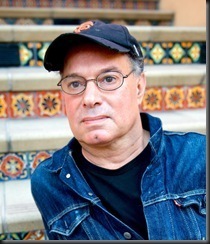 David-Elijah Nahmod is a film critic and reporter in San Francisco. His articles appear regularly in The Bay Area Reporter and SF Weekly. You can also find him on Facebook and Twitter.
David-Elijah Nahmod is a film critic and reporter in San Francisco. His articles appear regularly in The Bay Area Reporter and SF Weekly. You can also find him on Facebook and Twitter.
David developed Post Traumatic Syndrome Disorder (PTSD) after surviving gay conversion therapy as a child and has found that many in the LGBT community suffer from severe, often untreated emotional disorders due to the extreme anti-gay traumas they endured. This column chronicles his journey.
Anna Marie Duke Pearce
(1946-2016)
Anna Marie Duke Pearce was small in physical stature, but as an actress and as a mental health advocate she was a powerful force to be reckoned with. She became world famous as Patty Duke, winning an Oscar in 1962 for her mesmerizing portrayal of Helen Keller in The Miracle Worker. Keller was a blind-deaf girl who grew up to become one of the world’s greatest disability advocates. A little over two decades later, Duke would do the same for people suffering from mental illness.
Throughout the 1960s, Duke’s career was riding high. After the Miracle Worker she starred in The Patty Duke Show, a sitcom which ran for 104 episodes and which continues to air today on ME TV. Though her 1967 film Valley of the Dolls, an over-the-top melodrama about pill popping showgirls in Hollywood, turned out to be more of a campfest than a serious movie, it was a box office success and remains a cult favorite.
Duke continued to work steadily, winning an Emmy Award in 1970 for the TV film My Sweet Charlie, a then-daring tale of a pregnant, single Southern girl who falls in love with a Black man. One role after another followed–her 1972 horror film You’ll Like My Mother (newly out on Blu Ray) earned good reviews and was a moneymaker. A second Emmy came Duke’s way in 1976 for the acclaimed mini-series Captain and the Kings. Three years later Duke starred in a remake of The Miracle Worker–this time she played Annie Sullivan, the woman who taught Helen Keller how to speak and communicate.
Throughout all these career highs, Duke was suffering. Her life had become a series of outrageous psychotic episodes followed by deep, physically debilitating depressions. By the early 1980s, her career and her marriage to actor John Astin were unraveling.
In 1983 a desperately ill Duke was hospitalized. As she recounts in her 1987 autobiography Call Me Anna, her doctor walked into her room, informed her that she was suffering from manic depression (now known as bipolar disorder) and handed her a pill. Duke took those pills for the rest of her life.
Her manic episodes disappeared. Duke reclaimed her career, ultimately amassing more than 125 credits at Internet Movie Database by the time of her death on March 29, 2016. She served as President of Screen Actor’s Guild and dedicated much of her off-screen time to mental health advocacy. She wrote and spoke openly and honestly about her own manic episodes and let people know that help was out there–she let people know that they need not be ashamed because they had done nothing wrong.
More than anyone, Patty Duke, Anna, destigmatized mental illness and showed millions of people that recovery was possible. She let the world know by example that people with mental health issues could live full, rich and rewarding lives. Duke’s illness was not a character flaw, it was the result of a chemical imbalance in her brain.
My illness, PTSD, was caused by the after effects of the severe traumas I was subjected to, growing up as I did in an abusive home. Though PTSD and bipolar disorder are decidedly different conditions caused by differing situations, both can manifest themselves in similar ways.
As a child I loved The Patty Duke Show. But the sparkling teen I saw on my television screen stopped being Patty long ago. To her friends, her family, and to me she is Anna. Anna is a role model who helped me to realize that I could succeed as a writer and journalist in spite of my past and the PTSD symptoms which continue to lurk in my shadow. Without Anna, I would not be here today.
Duke’s son, actor Mackenzie Astin paid beautiful tribute to his mom at her memorial service 18 days after her death.
“She made it OK to be who you were,” Astin said, fighting tears. “She took her own story and gave it to the world, telling each and every other person so afflicted that they were not alone in their suffering. There are people alive today who would not be had my mom not had the audacity to put into print what had been too taboo before.”
Astin also urged people to continue his mom’s work. “Leave this memorial today with something of a call in your hearts,” he said. “I ask that you take Anna with you today, and to go forth and to speak freely to others about your experiences as she did about hers. There is considerable value in doing so–her life was proof of that. And I believe that by doing so, selflessly and with great courage, each of you can carry her work forward towards a greater community of understanding, acceptance and love.”
Count me in.
Mackenzie Astin’s speech can be viewed here: https://www.youtube.com/watch?v=kzH2lqgtxhk

